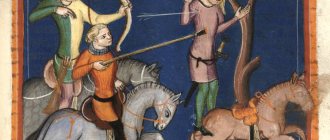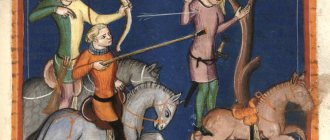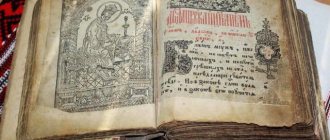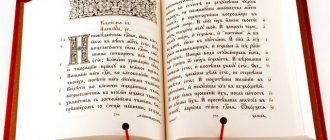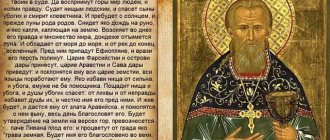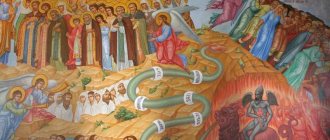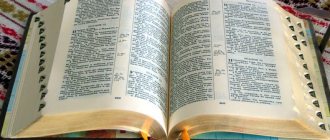King David suffered the unenviable fate of an exile. As a young man, he was anointed king to lead the people of Israel. But King Saul of Jerusalem found out about this and began to be extremely jealous of the shepherd. As a result, he took up arms against the young man, forcing the latter to wander and survive alone. But Saul did not know that God was always with David, who protected the future ruler and guided him on the true path. Psalm 58 is dedicated to one of these moments, when the fugitive prayed to the Lord for protection and the triumph of justice.
Text of prayer Psalm 58
In Church Slavonic
In the end, in order not to tempt David to scribble, Saul is always the ambassador, and with his thorns the hedgehog
1 Turn me away from my enemies, O God, and deliver me from those who rise up against me.
2 Deliver me from the workers of iniquity, and save me from man’s blood.
3 For behold, you have taken my soul, attacking me with might, my iniquity below, my sin below, O Lord.
4 They have tekokh and correct without iniquity; get up to meet me and see.
5 And You, O Lord, God of hosts, God of Israel, visit all languages, so as not to welcome the workers of iniquity.
6 In the evening they will return, curl up like dogs, and circle around the city.
7 Snares speak with their lips, and a sword is in their mouth, for who listens?
8 But You, Lord, laughing at him, despise all languages.
9 I will rule over you, for you, O God, are my protector.
10 My God, his mercy will appear before me, my God, he will show me against mine.
11 Do not kill them, lest they forget Your law; drive me away by Your power and overthrow me, O Lord, my protector.
12 The sin of their mouth, the word of their mouth, and let them be in their pride, and with oaths and lies be preached in the end.
13 In wrath there will be no end, but will be taken, because God has power over Jacob and the ends of the earth.
14 In the evening they will return and growl like dogs and circle around the city.
15 Tii will swell with crows. If they don't have enough and complain.
16 But I will sing of your strength and rejoice in the morning in your mercy, for you have been my protector and my refuge in the day of my pain.
17 You are my helper, I sing to you: as God You are my protector, my God, my mercy.
In Russian
For execution. Don't spoil it. David for the inscription on the pillar; when Saul sent to destroy his house to kill him.
1 Deliver me from my enemies, O God, and deliver me from those who rise up against me;
2 Turn me away from the workers of iniquity, and save me from the bloodthirsty people.
3 For behold, they have taken my soul, the mighty have taken possession of me, not because of my iniquity, not because of my sin, O Lord;
4 Without committing iniquity, I ran and walked, and stood to meet me, and behold!
5 And thou, O Lord, God of hosts, God of Israel, make haste to visit all nations, and have no mercy on all the workers of iniquity.
6 In the evening they will return and, hungry as a dog, will walk around the city.
7 Behold, they will speak with their mouth and with the sword in their mouth, because they think, “Who will listen to us?”
8 And You, O Lord, mock them; You do not hold all nations accountable for anything.
9 I will keep my strength with you, because you are my God.
10 My God, his mercy will soon meet me; my God will show it to me among my enemies.
11 Do not kill them, lest they forget your law; drive them away with your strength and crush them, my protector, the Lord.
12 The sin of their mouth is the word of their tongue. And let them be overwhelmed by their pride, and with curses and lies they will receive the news of the end.
13 With wrath they will end, and there will be no more, and they will know that God has power over Jacob and the ends of the earth.
14 They will return in the evening and, hungry as a dog, will walk around the city.
15 They will run away to eat, but if they are not satisfied, they will complain.
16 But I will sing in your strength and rejoice in the morning in your mercy, because you have become my intercessor and refuge in the day of my pain.
17 My help, I will sing to you, for you are my God, my protector, my God, my mercy.
Help from the Orthodox Psalm 33 for those reading it - Philosophy
The text of Psalm 33 in the Orthodox Psalter is preceded by the following unusual inscription: “A Psalm of David, when he pretended to be mad before Abimelech and was driven away from him and withdrew.”
Such a preface immediately suggests that this song was written on the basis of some historical event. Abimelech is not a name, but a title of the Philistine king, whose name was Achish.
It is known that David, as the conqueror of Goliath, was presented to Achish, and in order to get rid of the obsessive attention of the Philistine ruler, he was forced to pretend to be crazy.
Important
The interpretation of Psalm 33 explains the words “Come, children” (Ps. 33:12) in this way: having run away from Abimelech and finding himself on the street, David was surrounded by a crowd of children, but in order not to disturb his image of a madman, he was forced to continue the game, for which the children ridiculed him cruelly.
Already being a king, David greatly regretted this incident, because, in his opinion, he had lowered himself in the eyes of the younger generation, and the words “Come, children, I will teach you the fear of the Lord” indicate that he is ready to correct the mistake.
Read the text in Russian prayer Psalm 33
Psalm of David, when he feigned madness before Abimelech and was driven away from him and withdrew.
I will bless the Lord at all times; His praise is continually in my mouth. In the Lord my soul will glory; The meek will hear and rejoice. Magnify the Lord with me, and let us exalt His name together. I sought the Lord, and He heard me, and delivered me from all my dangers. Those who turned their gaze to Him were enlightened, and their faces would not be ashamed.
This beggar cried out, and the Lord heard and saved him from all his troubles. The Angel of the Lord encamps around those who fear Him and delivers them. Taste and see how good the Lord is! Blessed is the man who trusts in Him! Fear the Lord, all you His saints, for there is no poverty among those who fear Him. The Skimns are in poverty and suffer hunger, but those who seek the Lord do not suffer the need for any good.
Come, children, listen to me: I will teach you the fear of the Lord. Does a person want to live and does he love long life in order to see good? Keep your tongue from evil and your lips from deceitful words. Avoid evil and do good; seek peace and follow it. The eyes of the Lord are on the righteous, and His ears are on their cry.
But the face of the Lord is against those who do evil, to destroy the memory of them from the earth. The righteous cry, and the Lord hears, and delivers them from all their sorrows. The Lord is close to the brokenhearted and will save the humble in spirit. The righteous has many sorrows, and the Lord will deliver him from all of them. He keeps all his bones; not one of them will be crushed.
Evil will kill the sinner, and those who hate the righteous will perish. The Lord will deliver the soul of His servants, and none of those who trust in Him will perish.
Psalter, read Psalm 33 in Church Slavonic
I will bless the Lord at all times; I will make his praise in my mouth. My soul will glory in the Lord; let the meek ones hear and rejoice. Magnify the Lord with me, and let us exalt his name together. I sought the Lord, and heard me and delivered me from all my sorrows. Come to it and be enlightened, and your faces will not be ashamed.
This beggar cried out, and the Lord heard and saved him from all his sorrows. The angel of the Lord will encamp around those who fear him and deliver them. Taste and see that the Lord is good; Blessed is the man who trusts in Nan. Fear the Lord, all you saints, for there is no hardship for those who fear him. The rich became poor and hungry; Those who seek the Lord will not be deprived of any good.
Come, children, listen to me, I will teach you the fear of the Lord. Who is a person who loves life and sees good things? Keep your tongue from evil and your lips from uttering flattery. Avoid evil and do good; seek peace and marriage and... The eyes of the Lord are upon the righteous, and his ears are upon their prayer.
Advice
The face of the Lord is against those who do evil, even to consume their memory from the earth. The righteous cried out, and the Lord heard them and delivered them from all their sorrows. The Lord is near to those who are broken in heart, and will save those who are humble in spirit. Many are the sorrows of the righteous, and the Lord will deliver me from all of them. The Lord protects all their bones, not one of them will be broken.
The death of sinners is cruel, and those who hate the righteous will sin. The Lord will deliver the souls of his servants, and all who trust in him will not sin.
History of writing
When David the Shepherd was crowned Lord, it infuriated the then King Saul. He saw David as a threat and a rival, so he sent soldiers to find him so that they would not only capture the young man, but also kill him. The entire text of Psalm 58 is saturated with bitterness and fear, prayers and pleas for salvation. Despite many sins and the actions of God's laws, the Lord does not turn away from the Jewish people, but also does not leave King Saul, who embodies the worst traits of the Israelites, unpunished.
David ran home to hide from Saul and his robbers. Only God's mercy kept David alive. Michal's wife helped the young king escape, escape from the window and escape from the assassins. The young man’s prayers were answered, the Lord helped David to escape and kept him unharmed during this terrible time.
When to read Psalm 58?
Psalm 58 is performed in churches during services in the Old Church Slavonic version. This song is not only a plea for help, but also hope for the mercy and power of the Lord. It is allowed to link to the lyrics and the house.
Psalm 58 in Russian should be read in several situations:
- add strength in the fight against enemies;
- when protection from enemies is required;
- in various difficulties and trials;
- with language impairments, ask the Lord for the gift of the ability to speak.
When reading a prayer, you need to focus on the words and think only about your request so that it is heard. It is advisable to read Psalm 58 in front of icons with a lit candle or lamp.
References
- Parallel Latin/English Psalter/Psalm 57 (58) Archived May 7, 2022 in the Wayback Machine Mediumist.net
- "A Comparison of the Enumeration of Psalms in the Book of Divine Worship and in the Vulgate." Daily Office of the Catholic Church according to the Anglican View
. Retrieved November 7, 2022. - Spurgeon, Charles (2018). "Psalm 58 Bible Commentary." Christianity.com
. Retrieved November 25, 2022. - Spurgeon, Charles (2018). "Psalm 57 Bible Commentary." Christianity.com
. Retrieved November 25, 2022. - ^ a b
Guzik, David (2018).
"Psalm 58 - Words to and against evil judges." The indestructible word
. Retrieved November 25, 2022. - Creech, Jerome F. D. (2008). The fate of the righteous in the psalms
. Bowls Press. paragraph 27. ISBN 9780827236745. - ^ a b
"Midrash Tehillim / Psalm 58" (PDF).
matsati.com
. 2014. p. 1. - Henry, Matthew (2018). "Psalm 58". Bible Study Tools
. Retrieved November 25, 2022. - ^ a b
"Tehillim - Psalm 58".
Jewish Weekly
. July 6, 2022. Retrieved November 25, 2022. - "George Haydock's Catholic Biblical Commentary." StudyLight. 2022. Retrieved November 25, 2022.
- Slifkin, Nosson (2002). "Perek Shirakh" (PDF). Thor Zoo. Retrieved November 23, 2022.
- Brauner, Reuven (2013). "Shimush Pesukim: A Complete Index to the Liturgical and Ceremonial Uses of Biblical Verses and Passages" (PDF) (2nd ed.). paragraph 39.
- "Protection". Daily Tehillim
. Retrieved November 23, 2022. - Psautier latin-francais du bréviaire monastique
, paragraph 209, 1938/2003 - Regle de Saint-Benoit
, chapitre XVIII, traduction de Prosper Guéranger, (Abbaye Saint-Pierre de Solesmes, reimpression 2007) p. 46 - https://www.abbaye-montdescats.fr/?page_id=1887
- Simple, Felix. "Psalms and Verses Excluded from the Four Weekly Psalter." Catholic Resources
. Retrieved November 8, 2022. - https://anglicanorumcoetibussociety.blog/2017/08/20/omitting-psalms-and-bible-passages-from-the-lectionary/
- Curses in Prayer: The Healing and Preaching Meaning of Disrespectful Psalms Daniel Nerbass, Wipf and Stock Publishers, June 21, 2013.
- Shepherd, J., The Place of the Sacred Psalms in the Canon of Scripture - Part 1
Interpretation
To understand the interpretation of the 58th Psalm, it follows in separate verses:
- Verse 7 - “a sword is in their mouth” - the words spoken by sinners are like a sentence, like a sword, they take the lives of the innocent.
- Verses 2-3 are a description of the atrocities and evils committed by David's enemies. The author, however, speaks of his purity and justice, which do not persecute him for his sins.
- Verse 8 - For meanness and crime, God's punishment will follow.
- Verse 1 - “Deliver me from my enemies” - David’s main call to the Lord, a plea for protection and salvation.
- Verse 6—“hungry as a dog”—means that sinners have fallen short of God’s grace and His life-giving bread. “The city will be destroyed” - the loss of home, country, Jews.
- Verse 11 - the author asks not to kill sinners, but to scatter them throughout the world.
- Verses 9-10. David writes that the Lord heard his prayers and will come to his defense.
- Verses 12-15. For lies, pride, curses and other atrocities, sinners will be punished by the Lord. Eventually, stripped of everything, they will be forced to acknowledge the power of the Lord.
- Verses 16-17 are praise and gratitude to the Lord for the miraculous salvation. David calls him help, intercessor and mercy. Only the power of God can stop enemies and get rid of problems, bring peace and tranquility.
- Verses 4-5: David asks the Lord to protect him and punish all sinners.
Singer and musician
Like all Old Testament characters, Asaph is very important about his origin, with the help of which the Jews could prove their belonging to God's chosen people. The pedigree of the family began with Gersom
Asaph belonged to one of the Levitical tribes, being the grandson of Levi. The Levites served first at the Tabernacle, then at the Jerusalem Temple. They were musicians, singers or guards. They also had other responsibilities:
- teach parishioners the laws of the Torah;
- monitor the observance of order during services;
- sing psalms (which is what the author of Psalm 49 did);
- play musical instruments;
- help the priests during sacrifices.
Asaph was a contemporary of David and held a high social position. He led the singing at the Tabernacle, so it is not surprising that the minister also became the author of several psalms. His descendants are mentioned in the Bible in several places - in 1 and 2 Chronicles, Ezra, Nehemiah.
